You Get What You Pay For- How To Get The Most
Get The Most
Everyone is familiar with that old saying, “You get what you pay for.”, but it still doesn’t do the job of stopping people from cutting corners to try to save a few bucks here and there, or understanding that you can’t get high quality for the price of low quality. It is understandable; people work hard for their money and would like to save it where they can. But......
When I used to work as a salesman, one of the things we sold was the brand new samsung and apple tablets; they were priced at their quality, well plus a nice profit margin. So many times people would come into our store and say, “You guys are over priced. I can go down the street to so and so’s and get this for less than a quarter of that price.”
After 10 minutes of research I found out that this amazing deal they were talking about was a knock off piece of shit tablet that was also half the size. Then I explained to them that, yes, you can buy a tablet for a fraction of our price. You just can’t buy this tablet.
That is like going to a Lamborghini dealership and complaining about the cost by saying, “You guys are overpriced. I can buy a car for $1,500.” Well, Yes sir you can, just not this car.
Art is the same way. People ask me to make art for them sometimes and are either surprised that I quote them a price thinking that I should just do it for free, or say wow that is too expensive, I have a buddy that can do it for way less than that. I tell people it costs what it costs and if they have somewhere they can get a better deal then go ahead. If it takes me a week to complete a piece of art then that is a week of work. Would any one of those people work a whole week for free or open up their wages for negotiations? Hell no, and I won't either.
So here is my latest commission, two 5" x 7" graphite portraits. Let me tell you about how it came to be and what you can learn from this experience that might save you some time, money, and heartache as someone looking to buy art.
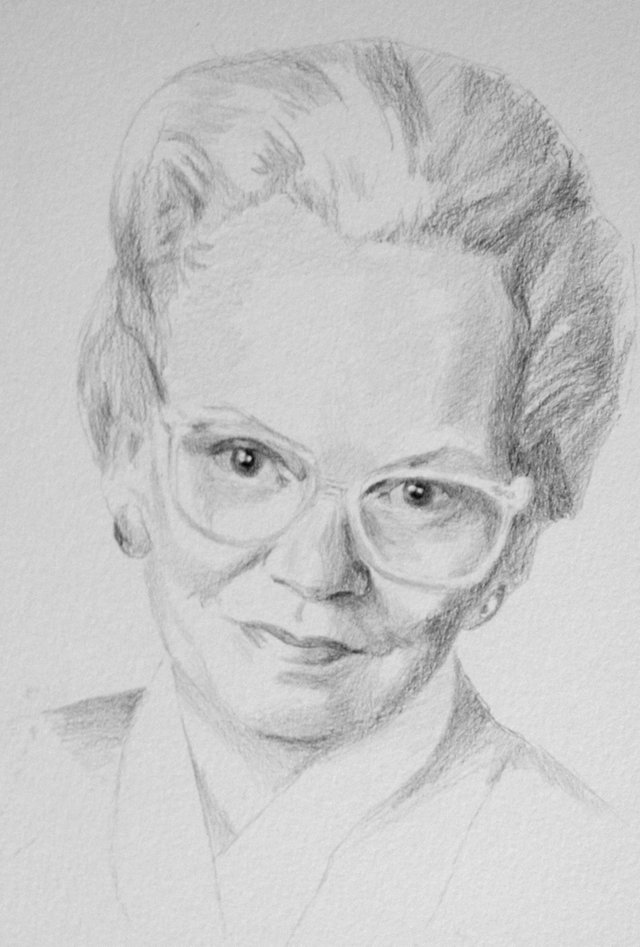
I had already closed off new commissions for Christmas since I wanted to make sure that anyone who ordered art with the intention of gifting it to someone would have enough time to receive, frame, or otherwise prepare it for the recipient. However, when I received the message below I really wanted to try my best to solve a previous client's problem, a real stressful Christmas nightmare. So a I opened it back up. Here is what happened:
Morning Terror
Earlier this week I received a message from a previous client. She had commissioned an oil painting that cost about $600 from me last year, and that really sold her on the idea of gifting people art again in the future. This year she tried to save some money, which doesn’t offend me at all, but unfortunately it didn’t work out for her. Trying to save money actually forced her into spending more money. Anyway, she messaged me first thing in the morning and basically said:
"I need your help. A local artist was doing a special on portrait drawings for Christmas so I asked her to do 2 for me. She never sent any progress photos and just sent me the final drawing and told me it was done and ready for pickup which never really opened up the conversation to whether or not we were satisfied the art. Neither one of them were accurate and I’m not sure if it is okay to tell her we are not pleased or how to go about making changes."Her only previous experience hiring an artist was hiring me last year so she was expecting progress shots and to be involved in the process as well as having her opinion matter. Unfortunately, this artist did none of those things and these drawings were done in pen so there was no changing them. Although the artists captured some small part of the likeness, the proportions were off quite a bit, and it ended up stretching these grannies out. My client made the joke that these were dainty women and the artist turned them into chubby grannies, which I thought would make a great premise for a parody rap song, but that is neither here nor there
Here Are the Reference Photos the Client Gave the Artist.
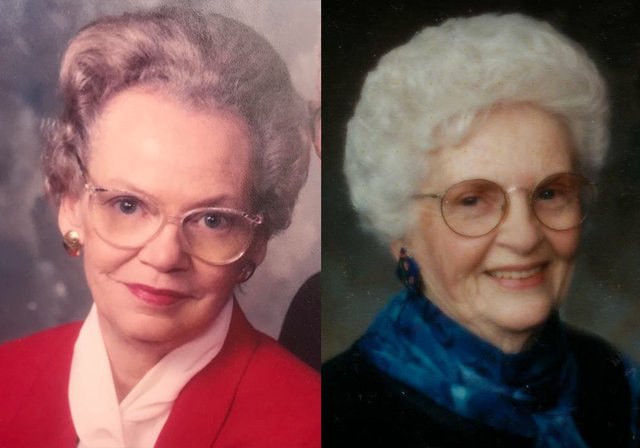
Here Are the Pen Drawings She Received From the Artist
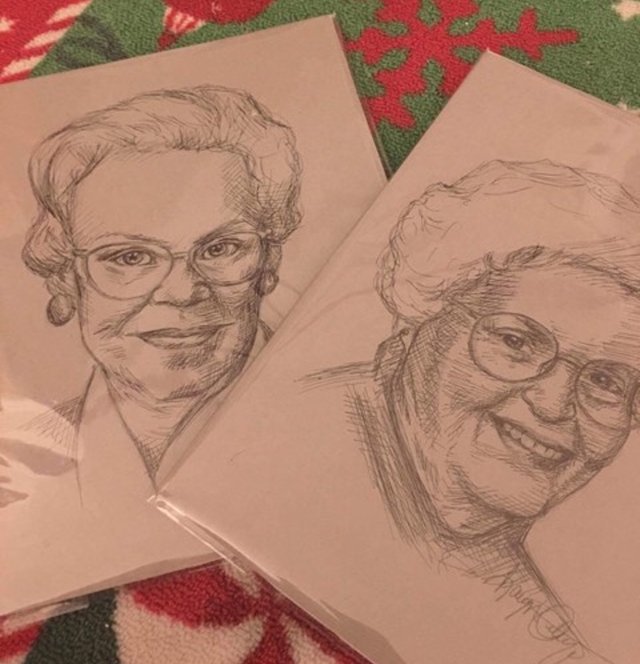
What To Do?
She was so upset and stressed out with Christmas coming so soon that she didn't know what to do. She asked, "Do I ask her to change it/start over or do I just take a loss and a lesson?" Imagine you paid somebody for the gift and the week before Christmas you find out it was a bust and you have nothing to gift, because you are too embarrassed to gift these to her and her husband's grandmothers.She actually asked me if it was okay to suggest changes or state that she wasn’t pleased. My answer was what it always is in such an occasion. If you are spending money on something you ought to get what you want, and when hiring an artist it definitely isn’t too much to ask that the drawing looks like the reference photo, and it isn’t too much to ask to be included in the process in some way.
People for the most part are completely unfamiliar with the process of commissioning art, and when inexperienced artists take no pride in the craft or experience it makes people fear getting burned so they turn to something else they are familiar with, and stop commissioning art.
Not All Heroes Wear Capes
She took a gamble that the artist would do the projects to her liking; now, trying to save money, she had paid an artist for art that she didn’t like and was in a bind since that was supposed to be the main gift that she was giving to 2 people, and Christmas is closing in fast. Now she was scrambling.
I told her I didn’t know if it would help, but I have a sale going on as well and I could do the pair of portraits 5” x 7” for $150 for and have them ship out to her in just a few days. She agreed, very thankfully told me that I was a lifesaver, and said she wasn’t sure why she ever even tried to go through anybody else. Then she said those time tested words, “You get what you pay for.”
There is More to Art Than Images
With me she knows exactly what she is paying for. She knows that I have the experience to ask the right questions to make sure that we are on the same page and she is getting everything that she wants. She knows that I am going to make sure she is involved by keeping her updated throughout the process and being open to input while giving her just enough options that she is aware of what can potentially happen and not too many options that she is overwhelmed. She knows that when it is all said and done that my main goal isn’t just to push out some art and collect payment, but to make sure she is satisfied with the entire experience as well as the art. A patron of the arts isn’t just paying for that piece of art they are hanging on the wall they are paying for an experience. I aim to always give them a good one
So in the End Would You Rather Have these 2 Portraits for $50 With an All Around Stressful and Crappy Experience,

Or Would You Rather Have These 2 Portraits for $150 with a great experience while being involved in the process and having the comfort and security of knowing that everything is going to go off without a hitch?
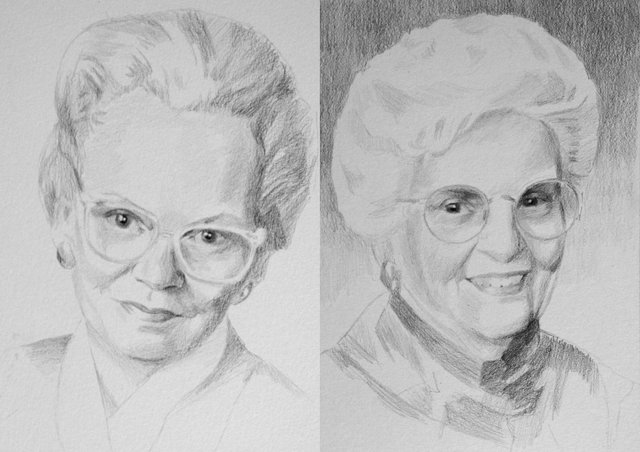
Instead of a Stress-Free $150 Purchase This Client Ended Up Spending $200 and Having to Live in a Scramble of Stress While Trying to Figure Out What to Do For a Gift Until I Was Able To Help. Hopefully You Never Have to Deal With That. So Here are Some Pointers to Help Avoid This Situation.
Things to Consider When Hiring an Artist
- Try to get a clear idea about what it is that you want. Artists can make a vision come alive, but they are not mind readers. To communicate your idea first get it in your head as clear as you can. If you are leaving it up to the artist then communicate that and any other expectations or boundaries you have for the project. How would you like it to look? Color Scheme? Mood? Where are you putting this art? Is it a gift for someone; if so who is that person to you? Is this a private piece?
- Always look at an artist’s previous work before you hire them. If you want somebody to do a lifelike portrait, but every piece of art you see in their portfolio is a dog stick figure then that probably isn't the right artist for the job. Some might just think, "Well an artist is an artist right?" Wrong. Like any other field people tend to specialize in a certain subject matter or style.
- Find some credentials. Do they have any? Do they have a facebook business page? Do they have a website or other online gallery? Surely someone somewhere knows something about them. Maybe they are just starting to build their art portfolio, so if you decide to use a new and emerging artist make sure you do enough research to get comfortable. This is a risk, but remember every artist had to start somewhere.
- Look for reviews. What are previous customers saying?
- What is your budget? Letting an artist know this can sometimes allow them to tailor a project to your budget. As an example, My prices are not negotiable. It costs what it costs, but sometimes details of the project can be changed to bring costs inside your budget. Artists have a lot of expenses, and not very many people realize that for a profession that generally doesn't pay much the supplies you need to do it are ridiculously expensive. Remember, you get what you pay for if you go looking for cheap work you are going to get cheap work.
- Choose a good reference photo. If you are not sure how I have placed some tips on that below.
- Ask lots of questions. Don’t fear overstepping boundaries. If you aren’t sure about something always ask
- Make your expectations for the project clear. I know I already said that, but you can't justify being upset that a project wasn't done a certain way if you didn't let it be known that was what you wanted.
I Will Make a Post Later Tonight or Tomorrow on How You, as an Artist, Can Improve the Commission Process for Your Clients . So Be Sure to Give Me a Follow That way You Don't Miss Out.
How To Pick the Right Photo for Portrait Work.
Yes. It matters. If you give an artist a low quality photo then most of what they are doing is guesswork, and while you already know what a friend or family member looks like, the artist most likely has no idea. So hear is how to pick the photo that gives you the best chance of ending up with a piece of art that you love.
Picking Great Photos for a Portrait Work
Some photos translate to a painting far easier than others. You will be doing yourself a huge favor if you start off with the right photo. Looking for a good photo you should keep these things in mind:
- Clarity: Something that is crisply in focus. Ideally you should be choosing which details to omit, not the photo
- Good Lighting: Ideally not taken with a flash. Flash tends to wash out all of the information such as color and value which gives you form. You want something with reflected or diffused lighting in most cases, or something with nice dramatic drop shadows. The reflective or diffused lighting gives you a smoother transition between values and the drop shadows kind of chisel the form It just catches the eye.
- Range of Value: Ideally a good reference photo will have dark darks, light lights and everything in between. A nice range of value shows off all of the forms.
Drop Shadow Examples That are Highly Translatable
Above are some of the reference photos I used for the "Cereal Killer" series. These aren't exactly High quality photos. They are pictures that I pulled from my friends' Facebook accounts that were taken with phones, not cameras, and have been compressed in the process of sharing them on social media. They are however, highly translatable into painting. The drop shadows chisel out forms and give more room to play with color interactions to describe the light. They also help with composition and mood.
High Quality References Without Drop Shadows

Above are some examples of high quality photos that you can see without the dramatic effect of strong drop shadows. These have a great range of value from the darkest darks to just the right amount of high intesity highlights. If you look you will notice that you can observe the many small forms contained by the face as a whole that are part of the skeletal and muscular structure. These shapes are just as important to creating a person's likeness and expression as getting their eyes, nose, and lips in the correct positions, the right shape, and size. These layers of colors and values that hold together the abstract forms that spell out the face are what helps make these photos so easy to translate into a painting.
It might be helpful to look at a few of the reasons that these photos are higher quality beyond the fact that they are highly translatable. These are much higher quality photos, for two main reasons:
- Controlled Lighting: they were taken with lots of reflective light. Having full control of the light in a photo improves the quality. So keep that in mind if you are taking reference photos.
- Camera: they were taken with my Canon EOS Rebel digital camera and haven't been compressed through sharing them on social media. There is a huge difference in the camera on your phone and an actual camera. The camera on your phone was made to look great on your phone or maybe even a computer, but if you have ever tried to print something off of your phone you will notice the quality is not what you had imagined. That is because screens, like your phone or computer are basically good up to 72 pixels per inch, so that is all your phone puts out. Where to print even a decent photo you should really be pushing out in the neighborhood of around 200. If I take a picture with my Samsung Galaxy 5, which has a 16 megapixel camera, the dimensions of that are roughly 3000 x 5000 pixels at 72 Pixels Per Inch. If I take a picture with my Canon the dimensions are roughly 2000 x 3000 pixels at 180 pixels per inch. That is an 11" x 17" photo. Now, if I drop the Pixels Per Inch down to 72 like the camera Phone then its dimensions are roughly 5000 X almost 8000 to give you a comparison to the phone on the camera, and this Canon is about 13 years old. I kind of got off on a tangent there talking about the difference in camera quality, but that might come in handy for those of you that didn't know.

Above are a few examples of photos that aren't necessarily "bad" photos, but they aren't as easily translated into a painting. The first painting would be a bit of pain to paint. The range of value just isn't there. It is slightly blurry and a little washed out. The values are so close together that it wouldn't appear to have any volume. You can notice that, because it is washed out, you can't see all those forms across the face that you could see in the previous examples that are so important.It is flat. So while it isn't a horrible photo, I would suggest avoiding using this as a reference photo if possible.
The second photo is drowning in shadows. Because there is some reflected light from her surroundings you can make out the larger forms of the face, but I wouldn't suggest using a photo like this to paint a portrait (especially if the face is the entire composition). Once you have it in paint it will probably just look like she is too dark since there is really no frame of reference from lighter values. They will just see the face you painted that is made up of the darkest range of values. If you were using this as part of a larger piece of art, and her face wasn't the entire composition, then this photo could work out just fine. I would also like to point out another feature to look for in a solid reference photo which is the warm reflected light that you can see on the underside of her arms and neck. This translate great into a painting and makes for a really interesting piece from the interplay between the cool blueish shadows and the warm reflected highlights. This looks great in paintings. Some of my favorite paintings have this type of reflected light.
The third reference here is an example of what I would say is a very good photo that just doesn't translate to a painting as easy as others might. It isn't washed out, but at the same time there aren't a lot of those really rich mid tones that bridge the gap from shadows to highlights that make it all clearly spelled out. This isn't to say that you couldn't take this photo and make a great drawing or painting, because you could. It just might not be as easy as some of the others that have been discussed here.
Hopefully this has given you a better idea of the types of things to look for when choosing a great photo for a painting. If you have any other questions about how to get the most out of your project let me know. Also, stop by Curious Observation to learn about commissioning and artist for a project or simply to get your custom artwork started today.
Don't Forget to Checkout My Huge End of the Year Sale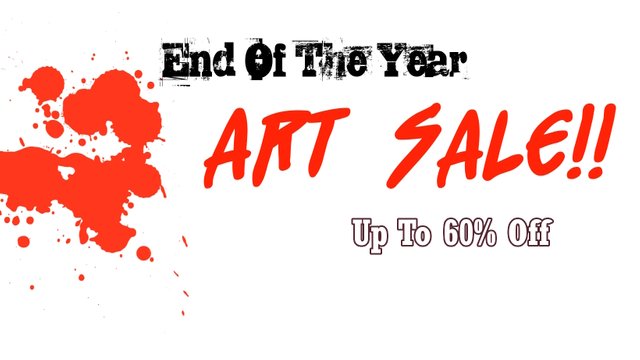
If you enjoyed this post I hope you upvote, resteem, and follow me. Comment with any insights, suggestions, questions, or complaints.
Pelicans in the Sun- A Photo Series Of Last Night's Sunset
GREAT NEWS!!! Huge End of the Year Art Sale, and I am now accepting Steem and Steem Dollars
Portrait Painting Tutorial- A Walk-through of the "Cereal Killer" Oil Painting Series
Sketching on the Graveyard Shift- A Collection of Portrait Sketches
Photo Realism- Why I Am Done Simply "Recording" Images
Fluid Paintings Round 3 (with video)
W.I.P.- Oil Paint Portrait I am Working On
Migraine Madness- A Series of Oil Paintings Portraying Migraines
Fluid Paintings Round 2 (With Video)
Abstract Explosionism- Painting With Guns (With Video)
Fluid Paintings Round 1 (With Video)
Picking the Best Photo for Your Portrait Painting
 |
 |
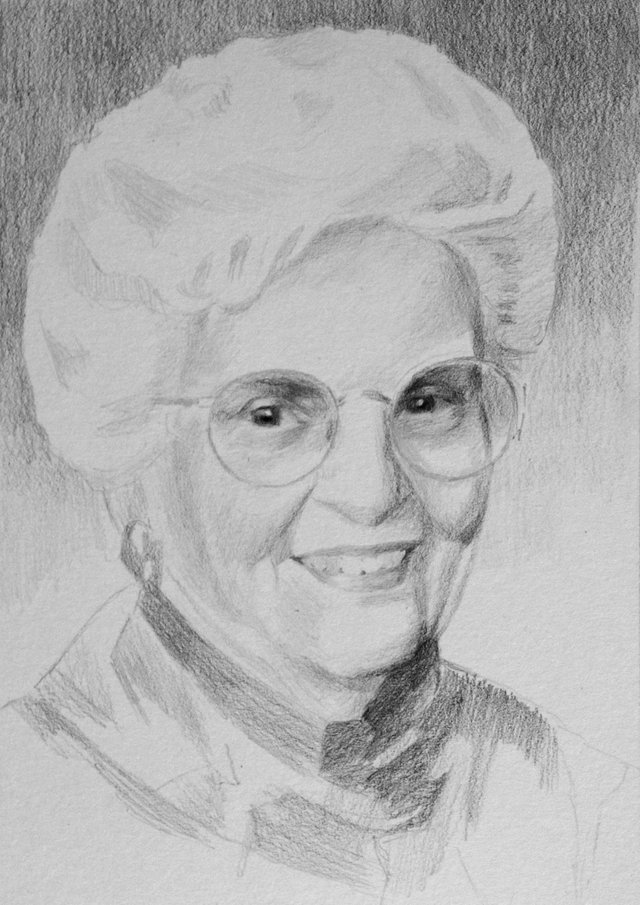





Excellent detailed post. Educating clients and other artists.
Thank you. These are just a few things that I feel are important. Hiring an artist is already an unfamiliar and uncomfortable for most since they have no frame of reference and don't know what to expect. Artists have a hard time getting work and don't need bad experiences scaring off would be art patrons forever.
Good drawing and interesting post
Thanks for reading
You're welcome:-)) you saved the situation with your portraits !!!!
Yeah and it felt better solve her problem than it did to get paid. It is a good feeling to be able to take away someone's stress.
You're so right:-))))